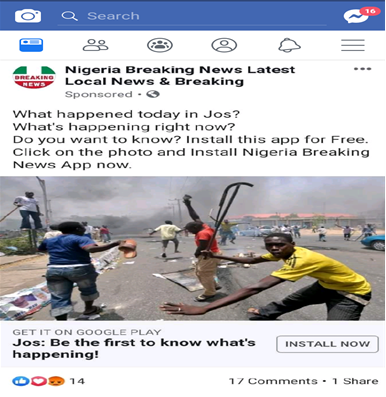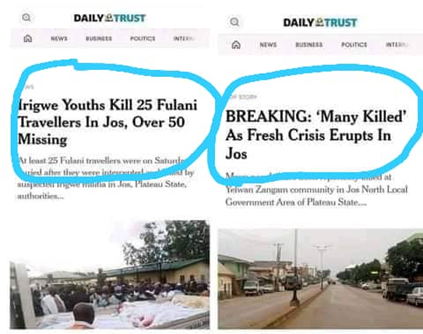By Lisa Gwamzhi
September 7, 2001 was like any normal day in Jos, the capital city of Plateau state, North Central Nigeria, until news began to make rounds that all was not well.
I had set out to visit my uncle at Dadin-Kowa, a community south of the city but never arrived at my destination as I was caught up in the crossfire between youths in the area. My now late mother could not sleep, worried by my absence and her inability to establish my whereabouts and safety.
The 2001 Jos crisis may not have been the first – as the 1994 conflict predates it – but it had an unprecedented effect.
Between 2001 and 2022, Armed Conflict Location & Event Data Project (ACLED) reports that 1,343 lives had been lost due to ethno-religious conflicts in Jos and its environs.
ACLED is a crisis mapping project that collects information on violence and protest events around the world.
The first Jos conflict in 1994 followed the appointment of a sole administrator in Jos north local government by the then Babangida Military administration.
For some victims of these conflicts over the years, life was never the same as the loss of loved ones, property and displacement in the city had affected social relations leading to mutual suspicion, deep-rooted hatred and fear amongst hitherto friends and kins.
Following the recurrent nature of the conflict with different timelines, sources and causes, the city of Jos and its environs became an arena of selling conflict, misinformation and disinformation.
Social media users habitually promoted their content using the conflict in Jos as click bait to attract attention, followership or traffic to their pages or sites.

A reverse image search showed that the picture was picked from the Guardian depicting the post-election violence experienced in northern Nigeria after the 2011 election that brought in the former Nigerian President, Goodluck Jonathan.
Another case of Misinformation was during the #ENDSARS protest, which pervaded almost the entire country challenging police brutality.
In Jos, the protest was hijacked by hoodlums and soon snowballed into violence, escalating into a religious conflict; this is not far from the fact that Jos has become a state that experts call a “fragile peace”.
The protest quickly degenerated into a religious crisis that placed the residents at risk, with multimedia messages soon flying on the social media space on either true or false incidents.
A Facebook user, zuma shared the below picture alleging that the Jaiz Bank in Jos was razed in the crisis. However, upon verification, it was discovered that no Jaiz Bank was situated at the said location.

Even the just concluded presidential 2023 election, which did not witness any breakdown of law and order in the state, had some misinformation shared on social media that the city of Jos was experiencing conflict as a result of the declaration of the 2023 presidential election result.
The once highly revered Home of Peace and Tourism became a theater of war, with once peaceful neighbours turning against each other. Loss of lives, properties and relationships has affected the people’s economic lives, with fear and distrust setting in.
In 2001, there was limited access to the internet as such access to information was amongst few people; however, “rumour” was largely spread during the conflict by word of mouth, between and among communities and individuals.
The 2001 Jos crisis, as it is called, heralded the series of conflicts experienced in the plateau state, including the 2008 and 2018 incidents, among others.
Rumours and Misinformation
Rumours and Misinformation thrive during conflicts; this is a result of confusion, manipulation, unavailability or lack of access to adequate, true or factual information and the overarching need to mobilize empathy and support for the parties involved.
While some of the information spread can be ignorantly done, others are a case of mischief and the desire to cause havoc.
This is seen in the way people peddle unconfirmed or verified information around.
According to a lecturer with the center for conflict management and peace studies, University of Jos, Mr. Samuel Obadiah, rumours played a key role in the escalation of the various conflicts in Jos and environs.
Mr. Obadiah attributed the gullibility of the people believing in rumours to the gap created by inadequate information.
“It’s either somebody is not giving someone information or the correct one, or someone is manipulating the information being given. So rumour was instrumental to the escalation of violence in Jos, particularly during the period where there was active violence in the city. This exposed the information management capacity of the state,” he said.
According to the lecturer, the period had no social media engagement, but mobile phones were already in use, aiding communication between and amongst people.
“It’s quite interesting that you find this news flying all over. The case of Jos has come a long way; you will notice that there are people who follow the news and also try to counter the misinformation in the public domain, ” he added.
One platform that has been leveraged to purvey fake news and misinformation in recent times is the new or online media as well as social media, where people across different ages, ethnicity, race and religion spread all kinds of information, be it true or false.
Mr. Godwin Okoko is with the Bege Foundation, a non-profit organization working in conflict transformation, particularly among the Youths.
He states that the misinformation and disinformation on the conflicts in Jos are not just spread by young people but also older ones who should know better.
“As much as young people also use it for misinformation, you will also see elderly and respected individuals in the community outside the use of platforms doing worse than what these young people are doing on social media,” he said.
Mr. Okoko submits that both young and old people are guilty of using the social media platform to spread false news about the state of Jos as it concerns conflict and calls for intensive awareness creation.
“Capacity building remains eminent in the fight against misinformation and disinformation. People need to learn that even as individuals, it’s not everything that will be put out there; we must understand that we can’t be drivers or channels for spreading hate,” he said
With the organization deeply involved in youth intervention in conflict transformation, Mr. Okoko explains that the aim is to redirect their mental and physical energy towards positivity. He reiterates that youths remain the population that suffers the negative impact of conflicts.
“They are also the population on the social media, so we have trained them on how to use the social media to dispel some of these negativities that are peddled on their communities,” he said.
Following the incessant conflicts in Jos, the Plateau state government, through legislation in 2016, established the State Peace Building Agency with the Mandate of promoting the culture of peace and harmonious coexistence among diverse ethnic and religious groups in the state, amongst other obligations.
Media and Conflict Reportage in Jos.
The media has also been accused of being biased in the conflict reportage experienced in Jos and its environs. Experts believe that the media was the reason some crises escalated as they used name-calling, showing sympathy to a party.
According to Mr. Samuel Obadiah, the selective and biased choice of media coverage largely affected the perception of the public on the conflict.
He asserts that “most of the media outfits were biased towards groups divided along ethnic and religious lines.”
This also gave rise to a series of media training on conflict-sensitive reporting as a good number of journalists at the time had not experienced that scale of conflict while practicing.
Despite that, media ownership and interest still played a large role in the choice of language of reportage and content. This still plays out in some reported incidents and has continually brought the media under criticism.


Conflict Interventions
Following the numerous conflicts in Jos and its environs, the state began to witness an upsurge of interventions from both local and international organizations in peacebuilding, and conflict transformation, which led to the creation of some institutions.
According to Mr. Samuel Obadiah, one of the conflict interventions of Non-profit Organizations was the establishment of the Center for Peace and Conflict Management and Peace Studies, University of Jos.
He added that with the support of USAID, the Embassy of the Netherlands and others, research was conducted that proffered solutions to the Jos crisis.
Aside from the establishment of the Plateau State Peace Building Agency established by an act of legislation in 2016, Operation Rainbow Neighbourhood Watch was also created.
These interventions, amidst others already cited in other works, were all aimed at Peacebuilding.
The Team Lead, Research and Development of the Plateau Peacebuilding Agency, Mr. Manji Mangrock, said the creation of the agency was a response to the many calls by Civil Society Organisations to tend to the peacebuilding needs of the state. He explained that this was aimed at conflict resolutions, Both new and |existing, conflict Mitigation and Prevention.
Mr. Manji adds that the agency has also been involved in Building relationships between conflict parties and seeing how they can foster their relationships.
He adds that the state has been in the media for the wrong reasons and explains that efforts by state and non-state actors to include “ reaching out to community members which covers a large base with the aged, women, people with disability, men and youths on peaceful coexistence and create platforms to address issues that affect their communities while they try to curtail information and address any form of misinformation about their communities before it spreads.”
The decentralization of information from state to local government levels has also been deployed by the agency with the creation of a community peace architecture forum which is a platform that hosts diverse stakeholders cutting across the religious bodies, traditional council, Youth, women and PWDs groups that have been brought together every month to brainstorm on the various misinformation about them and how to change the narrative.
At the state level, the agency is working closely with the media (Print, Broadcast, online and bloggers) to counter the misinformation being peddled against the state continually. They also use influencers to verify information on the social media on plateau state and try to put it in the right perspective.
“We have also engaged in training and meetings centered on conflict-sensitive reportage to see that it’s not only the negative aspect that is put out, but also the positives are fed to the people,” he said.
Technological advancement makes misinformation even worse as social media messages in conflict are manipulated to suit different victim narratives. The continued conflict in Jos has made it the symbol of unrest even when there is no incident.
Content creators find it convenient to use the crisis to sell their sites, given the sensitive nature of the issue as parties are divided across ethnic and religious lines.
While this continues, one only wonders what goes on in the mind of content creators and purveyors of misinformation amidst an already tense environment.
This story was produced with the support of the International Center for Journalists (ICFJ), in partnership with Code for Africa.
